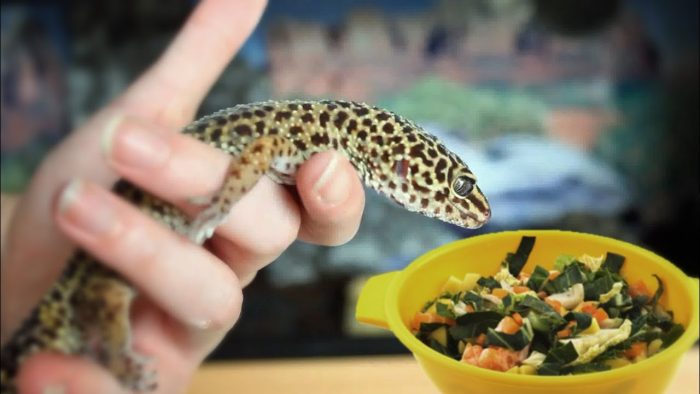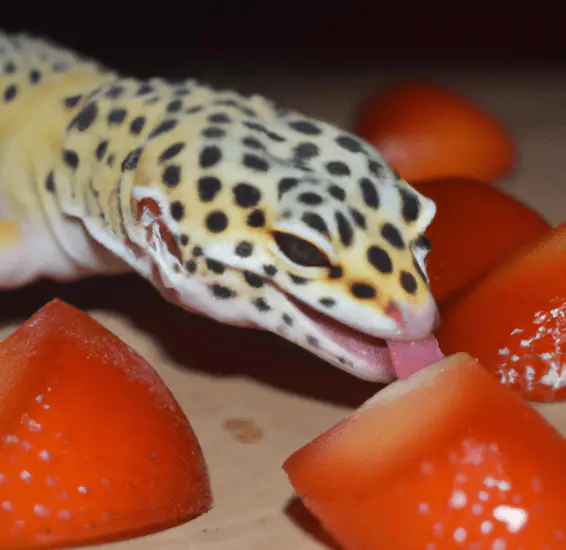
Leopard geckos are fascinating reptiles known for their unique appearance and captivating behavior. As an owner, it’s essential to provide them with a well-balanced diet to ensure their health and well-being. While leopard geckos primarily thrive on a diet of insects, many reptile enthusiasts wonder if they can incorporate fruit into their gecko’s diet. In this article, we will explore the question: Can leopard geckos eat fruit?
Leopard geckos, native to arid regions of Afghanistan, Pakistan, and India, are insectivores by nature. In the wild, their diet consists mainly of various insects, such as crickets, mealworms, and waxworms. These insects provide the necessary nutrients and moisture required for their survival.
Leopard Geckos’ Natural Diet
Leopard geckos have evolved to be highly efficient hunters of insects. Their digestive systems are specifically adapted to process the high protein content found in insects. In the wild, they use their keen sense of smell and excellent vision to locate and catch their prey.
Nutritional Requirements of Leopard Geckos
To ensure the health and longevity of your leopard gecko, it is crucial to provide them with a diet that meets their nutritional needs. The primary nutritional requirements of leopard geckos include proteins, fats, vitamins, and minerals. These elements are essential for their growth, reproduction, and overall well-being.
 Can Leopard Geckos Eat Fruit?
Can Leopard Geckos Eat Fruit?
Can Leopard Geckos Eat Fruit? (Digest Fruit)
While leopard geckos possess the ability to consume fruits, their digestive systems are not designed to extract optimal nutrition from plant matter. Fruits contain high amounts of sugar and are low in the essential nutrients that leopard geckos require. Therefore, relying solely on fruit as a food source can lead to nutritional deficiencies and health problems.
Fruit as an Occasional Treat
While fruit should not be a significant component of a leopard gecko’s diet, it can be offered as an occasional treat. Feeding small amounts of fruit once in a while can add variety to their diet and provide enrichment. However, it should never replace the main source of nutrition, which should consist of appropriately sized insects.
Suitable Fruits for Leopard Geckos
When offering fruits to your leopard gecko, it’s essential to choose options that are safe and suitable for their consumption. Some suitable fruits include mashed bananas, papayas, and apricots. These fruits have a soft texture and are easier for leopard geckos to consume and digest.
Preparing Fruit for Leopard Geckos
Before feeding fruit to your leopard gecko, it is crucial to prepare it properly. Remove any seeds, as they can be a choking hazard or cause digestive issues. Cut the fruit into small, bite-sized pieces, making it easier for your gecko to consume. Remember to remove any uneaten fruit from the enclosure promptly.
Monitoring Your Gecko’s Health
Pay attention to any changes in their appetite, behavior, or physical appearance. If you notice any signs of illness or discomfort, consult a reptile veterinarian immediately. Regular veterinary check-ups are also recommended to ensure your leopard gecko remains healthy.
 Can Leopard Geckos Eat Fruit
Can Leopard Geckos Eat Fruit
Common Mistakes to Avoid
When it comes to feeding leopard geckos fruit, there are some common mistakes that should be avoided:
- Overfeeding: Offering fruit too frequently or in large quantities can disrupt the gecko’s nutritional balance and lead to health issues. Remember, fruit should only be an occasional treat.
- Offering Unsuitable Fruits: Avoid feeding citrus fruits, such as oranges and lemons, as they can cause digestive upset in leopard geckos. Stick to the safe options mentioned earlier.
- Ignoring Hydration Needs: While fruits contain some water content, they are not sufficient to meet a leopard gecko’s hydration requirements. Always provide fresh, clean water in a shallow dish for your gecko to drink from.
- Neglecting Variety: Although insects should form the main part of a leopard gecko’s diet, it’s essential to provide variety in the types of insects offered. This ensures a broader range of nutrients and prevents nutritional deficiencies.
- Neglecting Calcium and Vitamin Supplementation: Leopard geckos require calcium and vitamin D3 to maintain proper bone health. Dusting insects with a reptile-specific calcium and vitamin supplement is crucial to prevent metabolic bone disease.
Conclusion (Can Leopard Geckos Eat Fruit)
In conclusion, while leopard geckos can consume fruit, it should only be offered as an occasional treat and not as a significant part of their diet. Their digestive systems are optimized for processing insects, which provide the necessary nutrients for their overall well-being. When offering fruit, choose safe options and prepare them appropriately. Monitor your gecko’s health closely and avoid common mistakes to ensure they thrive in captivity.
Can Leopard Geckos Eat Fruit?
FAQs (Can Leopard Geckos Eat Fruit)
Grapes are not recommended for leopard geckos. Stick to the safe fruits mentioned in the article, such as bananas and apricots.
Fruit should be offered as an occasional treat, about once or twice a month. It should not replace the main diet of insects.
Fresh fruits are always the best option for leopard geckos. Canned fruits often contain additives, such as syrup or preservatives, which can be harmful to your gecko
Yes, it is normal for leopard geckos to refuse fruit. They are primarily insectivores and may not have an interest in plant matter.
Signs of nutritional deficiencies in leopard geckos can include weight loss, lethargy, brittle bones, and improper shedding. If you notice any of these signs, consult a reptile veterinarian.
